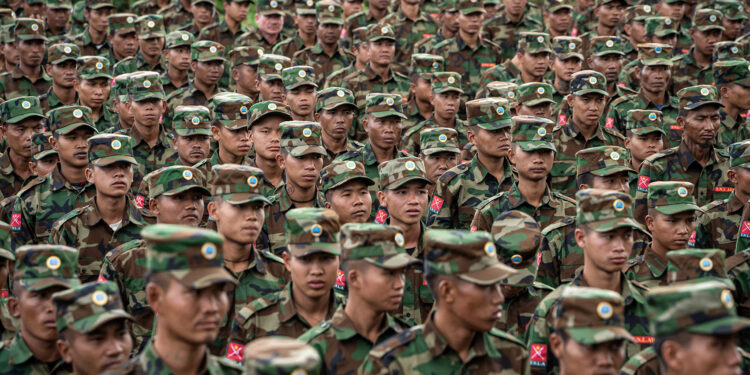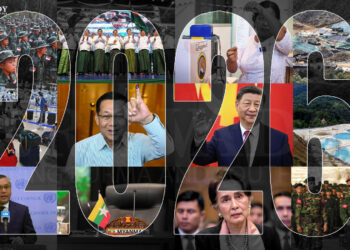In the complex politics of Southeast Asia, China’s true face has emerged with brutal clarity in Myanmar—a nation systematically dismantled not through open warfare, but through a meticulously orchestrated strategy of economic colonization and strategic manipulation. The ethnic armed organizations (EAOs) of Myanmar are now witnessing the predatory nature of Beijing’s intentions, revealing a sinister blueprint that goes far beyond diplomatic engagement. China’s recent actions unmask a calculated approach that prioritizes resource extraction and strategic control over Myanmar’s territorial integrity and the welfare of its diverse ethnic populations. Foreign Minister Wang Yi’s August visit to Naypyitaw marked a pivotal moment, signaling China’s unequivocal support for the military-led State Administration Council (SAC), effectively legitimizing the military regime that had seized power through a bloody coup.
The Chinese government’s strategy is multi-layered and devastatingly precise. By pressuring ethnic armed organizations like the Kachin Independence Army, Ta’ang National Liberation Army, Myanmar National Democratic Alliance Army, and Arakan Army, Beijing has demonstrated its willingness to weaponize diplomatic and economic coercion. The Chinese Special Envoy, Deng Xijun, has been actively working to disrupt these groups’ resistance, urging them to disengage from the West-backed National Unity Government and halt their offensives against the military regime.
Perhaps most revealing is China’s complete trade blockade along the Sino-Myanmar border—a deliberate attempt to strangle the logistical capabilities of ethnic armed organizations. This isn’t diplomacy; it’s economic warfare designed to crush resistance and maintain a compliant puppet regime that will facilitate China’s expansive economic ambitions. The China-Myanmar Economic Corridor (CMEC) emerges as the primary instrument of this neo-colonial strategy. Strategic projects like the Kyaukphyu deep-sea port and the oil and gas pipelines are not mere infrastructure investments but calculated moves to secure critical resource routes. By proposing a joint security company, China is essentially seeking to militarize its economic interests, creating a framework that allows direct intervention under the guise of protecting investments.
Junta leader Senior General Min Aung Hlaing’s visit to China in November was particularly telling.[1] Meeting Chinese Premier Li Qiang, he renewed commitments to CMEC projects while China promised support for elections—a hollow commitment that masks deeper intentions of maintaining control. The promise of a massive US$3 billion assistance package to strengthen the regime further exposes China’s willingness to prop up an illegitimate military government. The most alarming aspect of China’s strategy is its brazen disregard for Myanmar’s internal stability. By supplying advanced military equipment like drones and drone-jammers to the SAC, Beijing is actively prolonging the conflict. This isn’t about peace or development; it’s about creating a perpetual state of controlled chaos that allows continued resource extraction and strategic positioning.
Ethnic armed organizations are not fooled. They recognize China’s transformation from a potential neutral facilitator to an active participant in their subjugation. The Northern Alliance’s defiance of Chinese directives demonstrates a growing understanding of Beijing’s true intentions. The grenade attack on the Chinese Consulate in Mandalay is a stark manifestation of the rising anti-China sentiment among Myanmar’s diverse ethnic groups. The vulnerability of Chinese interests is increasingly apparent. Projects in conflict-prone states like Shan and Rakhine are now under threat, with resistance groups expanding their campaigns to specifically target Chinese assets. In July alone, anti-regime forces seized control of Chinese-backed factories, sending a clear message that external economic interests will not be tolerated without consideration of local autonomy.
China’s fear is palpable. The potential collapse of the military administration represents an existential threat to its economic and strategic designs. The exposed oil and gas pipelines—critical lifelines for China’s resource hunger—are now potential targets for sabotage. This vulnerability reveals the fragility of China’s so-called “non-interference” policy. The most tragic irony lies in China’s portrayal of the National Unity Government as being unduly influenced by Western powers. This accusation rings hollow when China’s own actions represent a far more aggressive form of external interference. By actively supporting a military regime responsible for widespread human rights abuses, China exposes its hypocritical stance on sovereignty and self-determination.
For Myanmar’s ethnic groups, this is a moment of painful revelation. China does not seek a stable, prosperous Myanmar. Instead, it desires a fractured, weakened state that can be easily manipulated, its resources plundered, and its strategic location exploited. The proposed joint security company is nothing more than a thinly veiled mechanism for direct territorial control. As resistance grows and international scrutiny intensifies, China’s calculations may yet unravel. The ethnic armed organizations, though diverse and historically fragmented, are united in their recognition of this existential threat. Their defiance—closing border gates, intensifying offensives, and rejecting Chinese directives—represents a powerful testament to the human spirit’s resistance against imperial ambitions. Myanmar stands at a critical juncture. The battle is no longer just against a military regime, but against a broader system of economic colonization that threatens to consume the nation’s sovereignty, resources, and very identity.
Vaishali Basu Sharma is a security and economic affairs analyst. She writes for leading news portals.

















